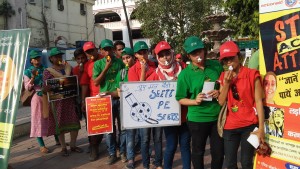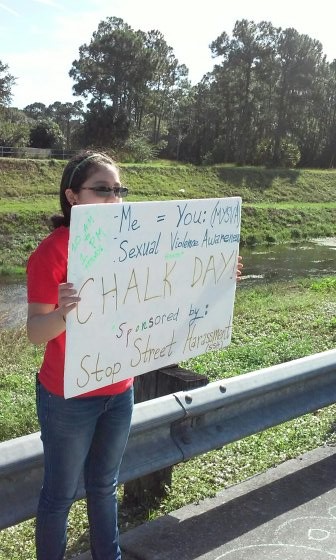Street harassment is a global problem and its manifestation can vary by community, region, and culture. Local community awareness-raising efforts and prevention initiatives are essential.
Stop Street Harassment (SSH)’s mentoring program empowers people to consider what efforts might decrease street harassment in their community, and then propose and carry out a project. Across four months, selected activists receive advice, network connections, input, and up to $350 for expenses from SSH.
APPLY TO BE A 2016 TEAM! Applications are due June 15, 2016 for projects that will take place between July 15 and November 30, 2016. 
Meet our 2015 Teams!
1. Stop Harcèlement de Rue – Lyon hosted an exhibition of drawings against street harassment in a number of locations in Lyon, France, including a high school, city square, and bar. Members of the group were on hand at various times to discuss street harassment with passersby.
October 2015: Read about their project and media coverage so far!
December 2015: Read their final blog post about their project.
 2. In India, the Safe Safar: Safe Streets project entailed gender-sensitization and anti-harassment trainings with auto rickshaw drivers in Uttar Pradesh. The team will also hold monthly awareness campaigns with street plays, signature campaigns, and public dialogue around the issue.
2. In India, the Safe Safar: Safe Streets project entailed gender-sensitization and anti-harassment trainings with auto rickshaw drivers in Uttar Pradesh. The team will also hold monthly awareness campaigns with street plays, signature campaigns, and public dialogue around the issue.
October 2015: Read about their project and media coverage so far.
 3. FILIA Centre hosted a three workshop series about street harassment at a high school in Bucharest, Romania. The students will have the opportunity to create art, videos, or write an essay on the topic during the process.
3. FILIA Centre hosted a three workshop series about street harassment at a high school in Bucharest, Romania. The students will have the opportunity to create art, videos, or write an essay on the topic during the process.
October 2015: Read about their project so far.
December 2015: Read their final blog post about their project.
 4. A high school student-led group Me=You: Sexual Harassment Awareness engaged in a number of actions in Florida, USA, around street harassment, including writing letters to the school board, writing articles for the school newspaper, and holding anti-harassment events for the local libraries’ monthly teen programming and sidewalk chalking.
4. A high school student-led group Me=You: Sexual Harassment Awareness engaged in a number of actions in Florida, USA, around street harassment, including writing letters to the school board, writing articles for the school newspaper, and holding anti-harassment events for the local libraries’ monthly teen programming and sidewalk chalking.
October 2015: Read about their project so far.
December 2015: Read their final blog post about their project.
Across 2013 and 2014, we worked with nine teams in eight countries (Afghanistan, Cameroon, India, Kenya, Nepal, Nicaragua, Serbia and USA) as they held workshops in schools and the community, conducted surveying, held outreach efforts, and changed laws.
